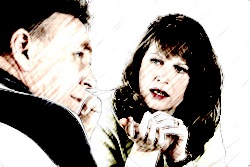When depression takes over your partner, you’re likely to go through an emotional waterboarding, a torture you have to escape. You may feel overwhelmed, confused, helpless to do anything. You take the brunt of the punishing anger or indifference that is all your partner can give you.
The relationship that means the most to you feels like it’s breaking fast. What can you do to keep yourself together?
There are thousands of men and women who have lived through this struggle or are in the midst of it right now. They have a lot of insight and share their painful stories in face-to-face support groups as well as online communities.
The members of one of the oldest of the online forums, Depression Fallout, report over and over again that the support of such groups has been a mainstay for dealing with their depressed partners. Communities like these might be a good starting point for you as well.
Here are 10 ideas drawn from the experience of people who have had to live with depressed partners as well as from my own experience as a depressed partner.
-
Take care of yourself as well as you can. When depression strikes and you find yourself living with a distant stranger, it’s only natural to focus first on your partner. You’re likely shocked and confused and want to bring back the familiar loving person you know. But it’s easy to lose sight of your own needs and gradually undermine the health and inner balance you need to get through the crisis. The obstacles are huge since your partner is right there and depression is now part of your life. It’s important to keep your own life going, get out of the hothouse as often as you can and spend time on the things that most help you relax.
-
Get help. There’s so much stress in living with depression that you should reach out for support. Perhaps you have caring friends you trust enough to confide in, or can find a support group, online communities, perhaps individual counseling, . That’s the critical first step. And keep on getting their help. You need regular support because the injury doesn’t stop until depression does.
-
It’s not your fault. Depression is the cause of the problem, not you. Nothing you’ve done could have brought on the ugly transformation of your partner – whatever accusations they might throw at you. Nor is it possible for you to fix the illness. Depression is complicated, not fully understood, and has multiple causes. No one really knows how to cure it. You may be able to help your partner get the right kind of help, but they need to commit to the work of recovery and stay with it.
-
Learn about depression and how pervasive an impact it can have. That will prepare you to recognize the many ways it can distort your partner’s behavior. You should realize, though, that what you’re learning is just a small part of an evolving field of research. It’s easy to jump to conclusions about exactly what’s wrong and what can be done about it. Consulting a mental health professional is a good way to get further insight into your partner’s illness.
-
Offer love and support without trying to be directive. Suggest it might be helpful – but pushing it, demanding that he get help in certain ways or learn what you’ve been learning won’t work. Tell him you’re trying to figure out what all the changes in the relationship have been about – and will be there to help as much as you can.
-
Depression can control you both. Be aware of the danger that you can easily be drawn into the same vortex that’s spinning your partner around. Anne Sheffield describes it as Depression Fallout. Michael Yapko writes that Depression Is Contagious. It’s common to develop your own illness as a result of living with a depressed person. That’s why it’s so important to get all the help you can and to watch your emotional and physical state.
-
Break the Cycle. One way to keep from being dependent on your partner’s moods is to look closely at your reactions to each of them. What are the worst, most painful moments for you – the ones that trigger your most intense feelings? What does your partner do to set you off? What is the feeling that wells up in you – anger, fear, hopelessness? And what do you do in response – meet attack for attack, hold your feelings in, leave? How do you feel about your own reactions afterward? It can help to track these reactions on paper at first to help you recognize the triggering events. That tactic could make it easier to interrupt your usual reaction, restore a sense of emotional independence and break the cycle that’s hurting you in so many ways.
-
Be tolerant of yourself. You probably can’t stop the emotional rollercoaster all at once or persuade your partner to get help or take perfect care of yourself. Expecting too much too soon can only lead to more frustration and reduced self-esteem. You already have enough of those to deal with.
-
You Can’t Go Back. Try to remember that the relationship you used to know may not return. It’s likely to be changed as a result of living with depression, especially if it recurs of if a single episode continues for several months, perhaps even years. It’s only natural to long for the return of the loving partner you used to know – your partner wants the same thing – but be prepared that it may not be so simple as that. You and your partner are more likely to face a gradual process of redefining how to live together.
-
They’re responsible for getting help. (edited 12/20/2013) Depression may be the underlying problem, but that fact doesn’t take away responsibility for destructive behavior. This is a difficult subject to talk about, and I do so from the perspective of someone who inflicted pain on his family during bouts of depression. When feeling better, I might well say something like: it was depression driving me to say and do those things. It’s not about you – don’t take it personally. But of course it’s personal. I was constantly leaving my wife and kids out of my awareness and often spoke and acted abusively. The anger, attacks, threats to leave and emotional withdrawal are as personal as it gets in a relationship. It’s especially important, then, to set boundaries. Depressed partners have to know when you can’t take anymore, or they cross a line that can’t be crossed. Remind them about what’s at stake and what you are really feeling. A depressed person is ill, yes, and probably wouldn’t choose to act hurtfully when well, so simple blaming is not appropriate. But there are supportive ways to remind them of your limits and insist that they get treatment. That is what my wife did for me, and it was a powerful wake-up call that got me back into treatment after a long period of denying the problem, despite my long history of depression.




